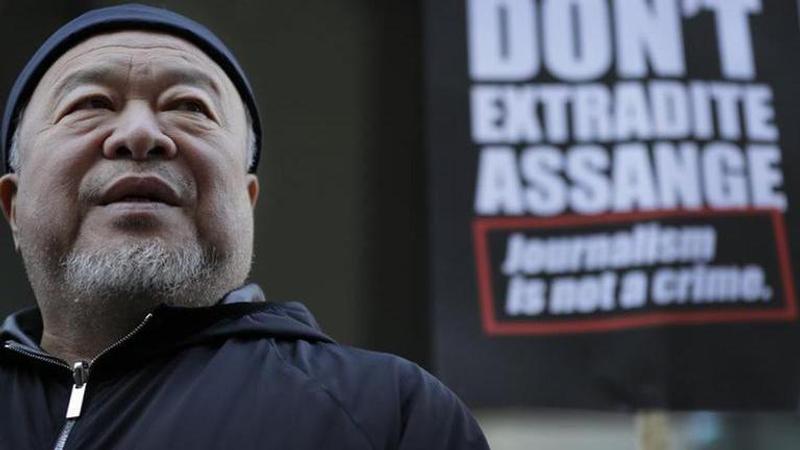Published 23:07 IST, September 28th 2020
Dissident Ai Weiwei protests possible extradition of Assange
The dissident Chinese contemporary artist Ai Weiwei staged a silent protest outside London's Old Bailey court on Monday against the possible extradition of WikiLeaks founder Julian Assange to the United States, where he is wanted on an array of espionage charges.

The dissident Chinese contemporary artist Ai Weiwei staged a silent protest outside London's Old Bailey court on Monday against the possible extradition of WikiLeaks founder Julian Assange to the United States, where he is wanted on an array of espionage charges.
The court, meanwhile, heard that Assange, if convicted in the U.S., could end up spending the rest of his life imprisoned in the federal Supermax prison in Florence, Colorado. The facility is home to Unabomber Ted Kaczynski, Mexican drug lord Joaquin “El Chapo” Guzman, 1993 World Trade Center mastermind Ramzi Yousef and Zacarias Moussaoui, the only man ever convicted in a U.S. court for a role in the Sept. 11 attacks.
Ai, who visited Assange at the Ecuadorian Embassy in London where he was holed up for seven years and subsequently at Britain's Belmarsh high security prison, said the authorities have a responsibility to protect the freedom of the press.
“He is prepared to fight, but this is not fair to him," he said. “Free him, let him be a free man.”
U.S. prosecutors have indicted the 49-year-old Assange on 17 espionage charges and one charge of computer misuse over WikiLeaks’ publication of secret American military documents a decade ago. The charges carry a maximum sentence of 175 years in prison.
As well as arguing that the extradition would pose a threat to Assange’s life, his defense team say that Assange is a journalist and entitled to First Amendment protections for the publication of leaked documents that exposed U.S. military wrongdoing in Iraq and Afghanistan.
“He truly represents a core value of why we are free — because we have freedom of the press.," Ai said. “We need a lot of protesting, and it can take any form. I’m an artist, if I cannot use my art, it’s very limited, then I’d rather just be silent.”
Assange’s father, John Shipton, was also protesting outside the court.
“Ai Weiwei is an artist of gigantic international standing, he stands alongside Julian to give the fight international meaning,” he said.
Ai, 63, is one of the world’s most successful artists, famous around the world for his installations of bicycles and sunflower seeds. In his native China, he was alternately encouraged, tolerated and harassed, spending time in detention and being barred for years from leaving the country. He was arrested at Beijing’s airport in April 2011 and held for 81 days without explanation during a wider crackdown on dissent. He is now based in Berlin and in the U.K.
On Monday, the court heard from two witnesses who said Assange would face intolerable conditions if extradited.
It is widely mooted that Assange would be moved to the pre-trial facilities at Alexandria Detention Center in Virginia if extradited. Other recent high-profile federal defendants there include President Donald Trump's 2016 campaign chairman Paul Manafort and Chelsea Manning, the former intelligence analyst who leaked a trove of documents to WikiLeaks and who tried to take her own life earlier this year at the facility.
Yancey Ellis, a Virginia-based lawyer who has had clients at the facility, said Assange would likely be put into an administrative segregation unit for months or even years that would be akin to “solitary confinement.”
And Joel Sickler, who heads the Justice Advocacy Group, said Assange would face “no meaningful interaction” in pre-trial confinement in a cell the size of "a parking space.”
Sickler, who has decades of experience in the field of the U.S. prison system, also said Assange would face the “real risk” of special administrative measures, or SAMs, being imposed on him by the U.S. Attorney General if convicted. The imposition of such measures could further curtail Assange's links and communications to the outside world as well as his movements within prison.
Sickler said it was highly likely that Assange could be sent to the Supermax facility in Colorado. The prison, also known as ADX, is so secure, remote and austere it has been dubbed the “Alcatraz of the Rockies.”
“Should Mr. Assange be sent to ADX he will almost certainly spend all his time in ADX in solitary," Sickler said in written testimony to the court. “While conditions at a penitentiary are severe, nothing compares to the near permanent solitary life of an inmate at ADX.”
Assange’s lawyers have argued that their client could very well try to kill himself if extradited to the U.S., while those acting on behalf of the U.S. government have sought to show that his mental state is not as bad as claimed and that he wouldn’t be subjected to improper conditions.
Assange's extradition hearing, which was delayed by the coronavirus pandemic, is due to end this week.
Updated 23:07 IST, September 28th 2020




